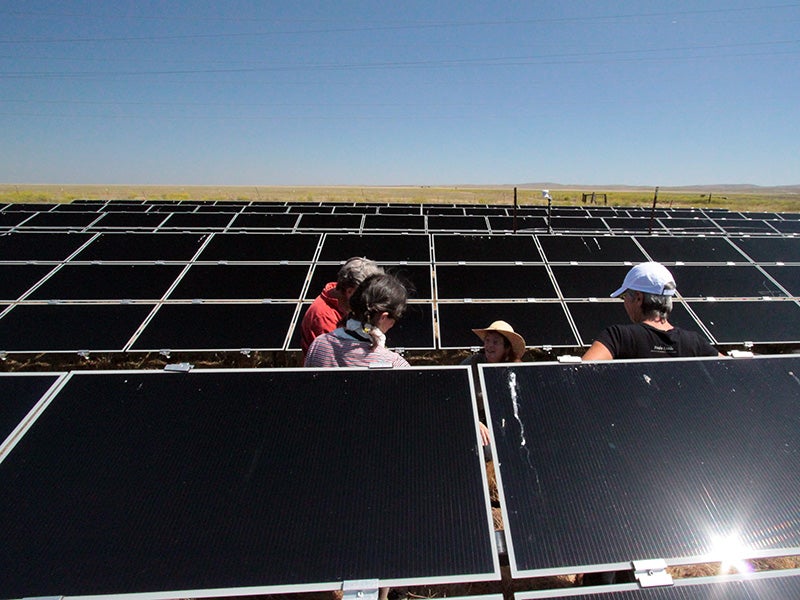Puget Sound Energy Must Strengthen its Clean Energy Plan
Victory
—In a win for climate and health, Washington’s utility commission requires the state’s largest electric utility to do more to ensure its transition to clean energy is equitable
Contact
At the urging of clean energy and environmental justice advocates, the Washington Utilities and Transportation Commission (UTC) has ordered Puget Sound Energy (PSE) — the state’s largest utility — to make sweeping changes to its four-year plan to comply with a 2019 state law charting an equitable and carbon-free energy future for Washington.
These changes require PSE to ensure its most highly impacted customers receive tangible benefits from its clean energy programs. Key changes range from more community solar projects that allow community members to subscribe to local clean energy, to increased targets for demand response programs which save customers money on their energy bills.
The ruling is a victory for Front and Centered and the NW Energy Coalition, represented by Earthjustice, who requested that UTC review PSE’s inaugural Clean Energy Implementation Plan for compliance with Washington’s Clean Energy Transformation Act (CETA). With 1.2 million electric customers across Western Washington, the utility’s transition to clean energy plays a key role in the state’s progress toward climate and equity goals. The ruling establishes that the UTC will ensure that CETA is implemented in a strong manner that delivers benefits to communities.
“This UTC ruling represents a long-awaited and significant step towards the equitable clean energy future promised under Washington’s Clean Energy Transformation Act,” said Lauren McCloy, Policy Director at NW Energy Coalition. “We’re grateful the commission agreed there were gaps in Puget Sound Energy’s plan and has ordered the company to address them. This decision raises the bar for public participation to ensure that customers and communities have a meaningful role in shaping PSE’s clean energy transition going forward, and will receive direct benefits from the transition. It establishes a strong precedent for PSE’s future Clean Energy Implementation Plans, and for other utilities around the state.”
“Washington’s transition to clean energy must benefit the people of color, low-income residents and communities at the frontline of the climate crisis. Prioritizing the most impacted communities in an equitable distribution of benefits and reduction of burdens will make CETA implementation truly transformative,” said Mariel Thuraisingham, Clean Energy Policy Lead at Front and Centered. “The UTC’s order is a major step to keep utilities on track and hold them accountable for a just transition to a clean energy future.”
Enacted in 2019, CETA requires electric utilities to transition to 100 percent clean energy, directing the state’s electricity supply to be 80% clean and carbon-neutral by 2030 and 100% carbon-free by 2045. CETA also contains a groundbreaking equity mandate that requires utilities to identify and reduce disparities among customers, incorporate equity principles into their planning and investment decisions, and ensure customers benefit equitably from the clean energy transition.
The Act requires investor-owned electric utilities to submit four-year plans, called Clean Energy Implementation Plans (CEIP), to the UTC detailing how they will comply with the law’s clean energy and equity requirements. Washington’s three investor-owned electric utilities — Puget Sound Energy, Avista, and Pacific Power — published their inaugural draft plans in 2021 for public comment. The UTC approved Avista’s CEIP in June 2022. Pacific Power’s CEIP is still under review. Front and Centered and NW Energy Coalition identified significant flaws in PSE’s implementation plan. The two groups argued that the plan contained significant gaps, lacked specific commitments from the utility, and did not comply with either the letter or the spirit of CETA.
Key changes required by the UTC include:
- Nearly doubling PSE’s community solar target
- Changes to the way PSE measures the customer benefits and burdens of its programs, including tracking and reducing energy burden and disconnections for nonpayment
- Ensuring that at least 30% of the benefits of all of PSE’s distributed clean energy programs flow to its most highly impacted communities
- Expanding the criteria PSE uses to designate its most highly impacted populations
- Requiring PSE to create new pilot program to engage directly with communities to develop clean energy plans and resources that benefit them
- Significantly increasing PSE’s demand response target and to expand its demand response service offerings
- Requiring PSE to fully account for the Social Cost of Greenhouse Gases and the value of energy storage in its planning models
Front and Centered and the NW Energy Coalition are represented by Amanda Goodin and Molly Tack-Hooper of Earthjustice, with expert support from GridLab. A copy of all testimony and briefs in the adjudication is available on the UTC webpage for Docket #UE-210795.

Additional Resources
About Earthjustice
Earthjustice is the premier nonprofit environmental law organization. We wield the power of law and the strength of partnership to protect people's health, to preserve magnificent places and wildlife, to advance clean energy, and to combat climate change. We are here because the earth needs a good lawyer.